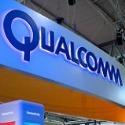
Qualcomm reported quarterly results that smashed through most financial analyst expectations, largely due to intense demand for the company's chipsets for smartphones.
But basking in a successful quarter is not the goal of Cristiano Amon, Qualcomm's new CEO.
"This is the foundation of a revenue diversification strategy," Amon explained during the company's quarterly conference call with analysts.
Amon was speaking of Qualcomm's new "Internet of things" business unit, which encompasses a wide range of products for a variety of market sectors. The operation posted $1.4 billion in revenues during Qualcomm's most recent quarter, a figure that's up 83% from the same quarter a year ago.
"We're very excited about this business," Amon said. He added, for emphasis: "It's very diversified."
Akash Palkhiwala, Qualcomm's CFO, offered some additional insight into the company's growing IoT business. He said Qualcomm splits it up among three main buckets: consumer, edge networking and industrial. He said each bucket is contributing significant revenues.
Palkhiwala said Qualcomm's consumer IoT business primarily revolves around laptops, wearables and virtual/augmented reality devices. For edge networking, he said that mainly involves Wi-Fi and 5G access points, including for 5G fixed wireless access (FWA) services.
"We're really at the very front end of that having a material impact for us," Palkhiwala said of 5G FWA.
The final bucket, industrial, covers a wide range of applications such as energy and metering, logistics and warehouse, retail and asset tracking. Palkhiwala said Qualcomm's industrial IoT operation is still in its infancy.
Overall, Qualcomm's IoT business is a relatively small part of a much bigger pie. The bulk of that pie involves the sale of chipsets to smartphone makers like Apple and Xiaomi. However, company officials are keen to tout the IoT business to investors who may be concerned that Qualcomm's core smartphone business may have little room to grow.
Phone growth
That, however, is not the story Qualcomm's Amon is telling. "We're very happy with the way things are progressing," he said of the company's core smartphone business. After all, Qualcomm's smartphone business is riding a wave of mostly positive developments in recent years.
Perhaps most importantly, Apple is using Qualcomm's silicon in its latest iPhones – and Apple just this week reported another blockbuster quarter of iPhone sales. Separately, China's Huawei has been retreating from the market due to US sanctions against the company, opening the door for Qualcomm to score business with companies like Xiaomi that are capturing market share as a result. And though Qualcomm is facing challenges from chipset rivals like MediaTek, Qualcomm officials maintain that the company has a virtual lock on the high-end Android phone market.
Overall, Qualcomm reported $1.92 in earnings per share, above most expectations of around $1.68 per share, as noted by CNBC. In quarterly revenues, Qualcomm posted $8 billion, ahead of expectations of $7.58 billion.
Finally, Qualcomm officials addressed the chipset shortages that have affected much of the global electronics industry. They said the company's efforts to secure components from multiple suppliers are bearing fruit, and that Qualcomm is on track to significantly improve its supply by the end of this year.
Related posts:
— Mike Dano, Editorial Director, 5G & Mobile Strategies, Light Reading | @mikeddano
About the Author(s)
You May Also Like




_International_Software_Products.jpeg?width=300&auto=webp&quality=80&disable=upscale)







